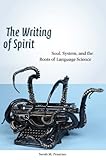The Writing of Spirit : Soul, System, and the Roots of Language Science / Sarah M. Pourciau.
Material type: TextPublisher: New York, NY : Fordham University Press, [2017]Copyright date: ©2017Description: 1 online resource (384 p.)Content type:
TextPublisher: New York, NY : Fordham University Press, [2017]Copyright date: ©2017Description: 1 online resource (384 p.)Content type: - 9780823275656
- Historical linguistics
- Historicism
- Language and languages
- Languages, Modern--Study and teaching
- Linguistics
- Structuralism (Literary analysis)
- LITERARY CRITICISM / Semiotics & Theory
- German Romanticism
- Jakobson
- Saussure
- Sprachgeist
- Structuralism
- historical linguistics
- philology
- philosophy of history
- system
- writing
- 418.007 23
- P121 .P688 2017
- online - DeGruyter
| Item type | Current library | Call number | URL | Status | Notes | Barcode | |
|---|---|---|---|---|---|---|---|
 eBook
eBook
|
Biblioteca "Angelicum" Pont. Univ. S.Tommaso d'Aquino Nuvola online | online - DeGruyter (Browse shelf(Opens below)) | Online access | Not for loan (Accesso limitato) | Accesso per gli utenti autorizzati / Access for authorized users | (dgr)9780823275656 |
Frontmatter -- Contents -- List of Abbreviations -- Introduction -- Part I. “The Eternal Etymology”: From Sprachgeist to Ferdinand de Saussure -- 1. Language Ensouled -- 2. Saussure’s Dream -- 3. Verse Origins -- Part II. Tending toward Zero: From Runes to Phonemes -- 4. Wagner’s Poetry of the Spheres -- 5. Pythagoras in the Laboratory -- 6. Jakobson’s Zeros -- Afterword -- Acknowledgments -- Notes -- Bibliography -- Index
restricted access online access with authorization star
http://purl.org/coar/access_right/c_16ec
Contemporary thought has been profoundly shaped by the early-twentieth-century turn toward synchronic models of explanation, which analyze phenomena as they appear at a single moment, rather than diachronically as they develop through time. But the relationship between time and system remains unexplained by the standard account of this shift. Through a new history of systematic thinking across the humanities and sciences, The Writing of Spirit argues that nineteenth-century historicism wasn’t simply replaced by a more modern synchronic perspective. The structuralist revolution consisted rather in a turn toward time’s absolutely minimal conditions, and thus also toward a new theory of diachrony.Pourciau arrives at this surprising and powerful conclusion through an analysis of language-scientific theories over the course of two centuries, associated with thinkers from Jacob Grimm and Richard Wagner to the Russian Futurists, in domains as disparate as historical linguistics, phonology, acoustics, opera theory, philosophy, poetics, and psychology. The result is a novel contribution to a pressing contemporary question—namely, what role history should play in the interpretation of the present.
Mode of access: Internet via World Wide Web.
In English.
Description based on online resource; title from PDF title page (publisher's Web site, viewed 02. Mrz 2022)


